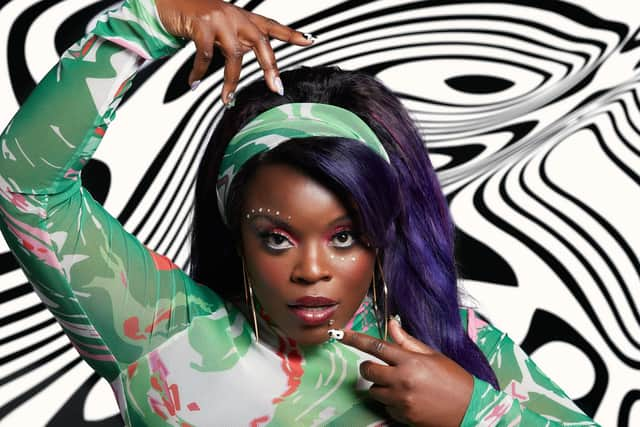Album reviews: Barbra Streisand | Yola | Alasdair Roberts og Völvur | Alex Rex


Barbra Streisand: Release Me 2 (Legacy Recordings) ***
Yola: Stand For Myself (Easy Eye Sound) ****
Alasdair Roberts og Völvur: The Old Fabled River (Drag City) ****


Alex Rex: Paradise (Neolithic Recordings) ****
A decade on from rarities compilation Release Me, Barbra Streisand presents another bespoke collection of new old material. Release Me 2 features ten previously unheard studio recordings, stretching back to her earliest work in 1962, some of which have been given a bit of 21st century spit and polish, though not to the detriment of the easy listening spirit which pervades the collection.
Advertisement
Hide AdAdvertisement
Hide AdEarly/mid 70s recordings of Carole King’s You Light Up My Life and Randy Newman’s Living Without You are retrieved from the shelf, along with Bacharach & David’s think-of-the-children Be Aware, originally recorded in 1971 for a television special.
One Day (A Prayer), dating from 1968, is equally softball, its twinkling orchestral arrangement swelling up behind her delicate vocal, a musical world away from the turmoil of that year.


The cutesy musical theatre of Right As the Rain is the earliest recording here, with ingenue Streisand in full-throated dynamic flow backed by elegant orchestral flourishes. Eleven years later, that promise has developed into the full diva command of Once You’ve Been In Love.
A couple of middle-aged duets play to her mischievous side, as she revisits her musical affair with Barry Gibb on the coquettish shuffle of If Only You Were Mine, and flirts with Willie Nelson at the end of their schmaltzy duet I’d Want It To Be You. But she reserves most of her rapture for the immortal Rainbow Connection, sung with Muppets maestro Kermit, who sounds a touch robotic (frog in his throat? I’ll get my coat…).
Bristol-born Yola found her niche – and particular recognition in the States – as a country soul singer with her 2019 debut album Walk Through Fire. Her follow-up, Stand For Myself, again produced by Black Keys frontman Dan Auerbach in her adopted home of Nashville, extends her palette to encompass the floaty disco of Dancing Away the Tears, classy cocktail soul of Now You’re Here, shimmering slow jam Like a Photograph and easy listening ache of Barely Alive.
The laidback soul/R&B tone reflects her Tennessee base but she doesn’t pull her punches lyrically on the rather pessimistic call to arms Diamond Studded Shoes or the declamatory title track. Brandi Carlile joins in on the testifying country rock of Be My Friend and, airing another texture in her versatile voice, Yola brings some Tina T welly to the bubblegum Whatever You Want.
Glasgow-based folk singer/guitarist Alasdair Roberts continues his collaborative efforts, this time with Völvur, a Scandi collective formed by fiddler Hans Kjorstad, whose spindly strings and jazzy runs on clarinet complement Roberts’ reedy, beseeching tone.
Advertisement
Hide AdAdvertisement
Hide AdVocalist Marthe Lea leads on Nu rinner solen opp and Nu solen går ned, two Norwegian songs on the rising and setting of the sun, which are set against drones and swooping woodwind, while Robert Burns’ Song Composed in August is sung in tight a capella harmony by Roberts, Lea and bandmate Fredrik Rasten.
As usual with Roberts’ recordings, it is hard to distinguish the joins between traditional song and his simpatico originals, with their customary richness of allusion and baroque folk arrangements.
Singer/drummer-about-town Alex Neilson, aka Alex Rex, has never sounded more like a British Bonnie “Prince” Billy than on his lusty latest. “I was created by my mother – with a few minutes of work from my dear old dad” proclaims the playful sage on The Dark Inside the Shadow, before moving on to make like an acid Ennio Morricone on Dancing Flame and bust out some James Brown call-and-response on the urgent garage rock’n’roller What’s Shouted in the Dark (The Dark Shouts Back). His most commercial release to date is all the more impressive for Neilson’s imposition of a no-rehearsal, three-take limit on his fellow musicians.
CLASSICAL
Beethoven: Hammerklavier Sonata & Eroica Variations (Pentatone) ****
The Hammerklavier Sonata and Eroica Symphony are among the greatest pillars of the Beethoven canon. Pianist Pierre-Laurent Aimard’s trick here is to pair the former with the Eroica Variations, the elemental single-line theme of which was to prove the nucleus of the eventual symphony. The pairing is perfect: the often bite-sized proportions of the piano variations refreshingly easy to digest in the wake of the protracted density of the Hammerklavier movements, without any losing their all-embracing monumentalism. It’s a heroic feat for the pianist, and one he used the enforced “recess” of Covid to achieve. The Hammerklavier is massively authoritative, but not without the signature volatility expressed through its volcanic, often bewildering language. Aimard unearths an unworldly surrealism in the Adagio and inexorable logic overall. The effortless flow of the Eroica Variations serves to amplify their exhaustive creativity. Ken Walton
FOLK
Chris Newman: Breaking Bach (Old Bridge Music) ****
What does a long-respected folk guitarist do when all work dries up during lockdown? Why, re-arrange JS Bach’s partitas and sonatas for the unlikely-sounding medium of flat-picked, steel-strung guitar of course. This audacious and eminently enjoyable hijacking sees Chris Newman, who has played with the likes of Stéphane Grappelli, the Boys of the Lough and, of course, in his outstanding duo with Irish harpist Máire Ní Chathasaigh, lend a distinctively ringing but also regardful character to this hallowed canon. Subtitled Flatpicking the Partitas, the recording indeed features extracts from the Flute Partita in A minor and the Violin Partita No 2 in D minor, but also delves into the Cello Suites and Violin Sonatas. In fact it is with the prelude, courante and jig from the Violin Sonata No 3 that Newman opens briskly, establishing a brightness and brio that pervades these interpretations. Jim Gilchrist
A message from the Editor:
Thank you for reading this article. We're more reliant on your support than ever as the shift in consumer habits brought about by coronavirus impacts our advertisers.
If you haven't already, please consider supporting our trusted, fact-checked journalism by taking out a digital subscription at https://www.scotsman.com/subscriptions